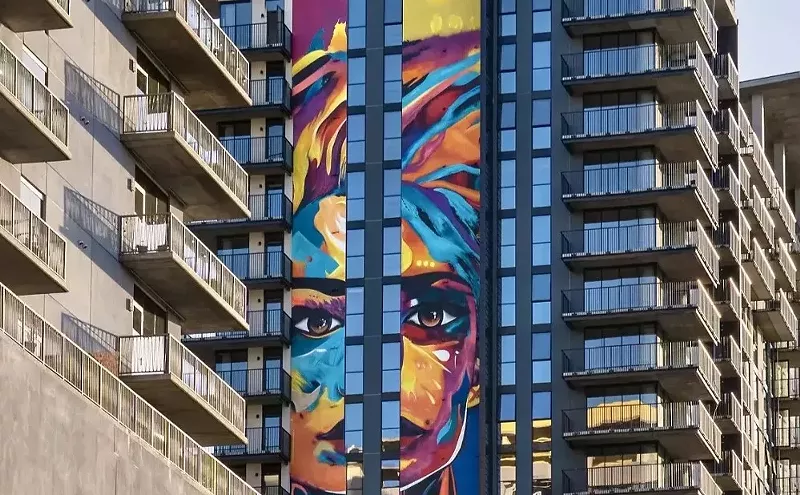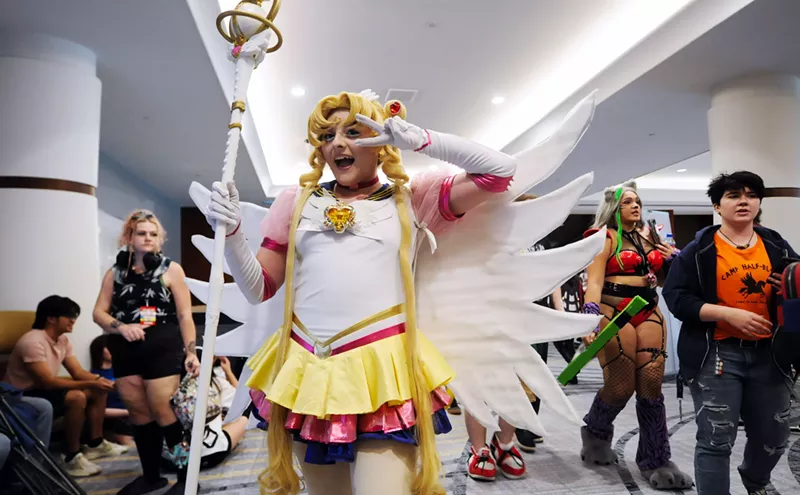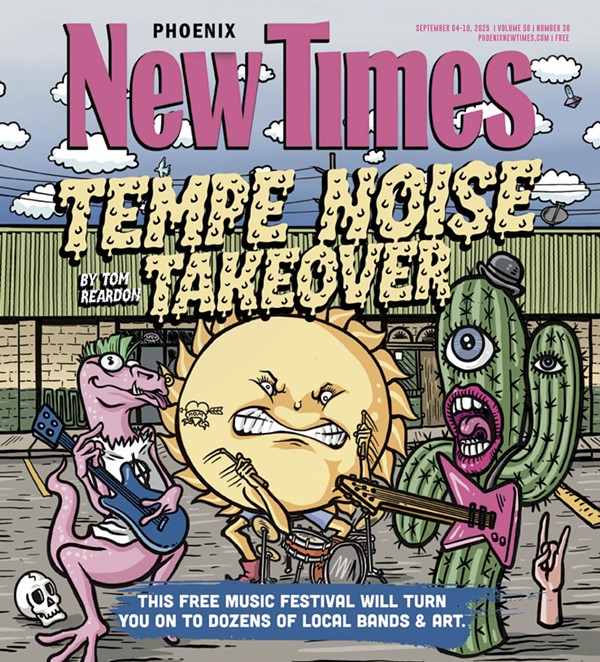There's no doubt that it's become more convenient to talk at people via social media platforms than to share a face-to-face dialogue, so it's refreshing that someone like ASU lecturer of English Rosemarie Dombrowski is keeping the art of critical discourse alive. In addition to taking part in other events downtown such as the Phoenix Poetry Series at {9} The Gallery, Dombrowski and Four Chambers Press host Get Lit every first Thursday in Valley Bar’s cozy Reading Room.
For those who enjoy a night at the bar but don't do well with crowds, or would rather meet new people by engaging in thoughtful discussion rather than shouting over music, Get Lit provides a space to do so. The group's monthly meetings have been going on for nearly a year, and are always full of lively, thought-provoking discussion. Inspired by the literary and philosophical salons of 17th-century France, each month Dombrowski picks a topic for Get Lit and leads an open talk with its patrons.
This month's theme is "Stand-up Literature," and the gathering takes place on Thursday, June 2. At the very least, it will address the role of humor in a poetry reading and performance, how poetry intersects with stand-up comedy, and if such a thing even exists. New Times asked Dombrowski a few questions about the topic and the impetus behind her Get Lit events.
I'm under the impression that your events are inspired by 17th-century French salons. Can you briefly describe the history of the salons and what would happen at those events?
I attribute the salons to Benjamin Franklin, who brought them to America in the 18th century. They primarily revolved around intellectual conversation regarding politics, society, literature, and the arts. Sometimes, the participants exchanged their writing. Sometimes, the married men brought their wives, who then exchanged their writing with other women. Though their history is somewhat exclusive – limited to the literate upper-class – they're an important part of the development of women's literature in the 18th century, and that's the crux of their historical appeal for me.
Aside from those gatherings, are there any other historical reference points that influence your events?
I can’t deny that any gathering in which the socio-cultural impact of literature is discussed doesn’t harken back to/isn’t being influenced by the Beats, or the San Francisco Renaissance, or the Fresno poets. These are some of the most critical movements (literarily speaking), and they're also the movements that have had the most profound social impact. If poets were to replace the politicians in this country, people would begin to see real change.
What about the salon style format is appealing to you?
I’ve been in the college classroom for over 15 years, and so to me, this is the best version of the seminar-style, round-table discussion. Everyone’s “done the reading” so to speak, and everyone has an informed, impassioned perspective. At the very least, everyone who attends is eager for banter and debate.
There's a particular theme to each month's event. Have there been any that were especially memorable or challenging for you?
We’ve discussed the literary canon and its gatekeepers, the seeming prohibition on women who write “sexual deviance,” the ongoing challenge to meaningfully bridge spoken-word and page poetry, and the re-emergence of spiritual-but-not-religious literature.
Since I generate the topics, I’ve found them all challenging, but only because they’re the topics that continually plague me or my students and seem to generate an endless array of theories, anecdotes, and opinions. Each topic was met with lively conversation, but I’m sure the alcohol helped!
In regard to this month's topic, "stand-up literature," are there any writers that you think are good examples of this or ride that line particularly well? Also, are there any comedians that you feel are good bridges of this theme?
The first person that comes to mind is Mike Birbiglia, who I’d arguably dub a storyteller rather than a stand-up comedian, especially in light of his stand-up special entitled My Girlfriend's Boyfriend, which is a masterfully threaded series of scenes (replete with flashbacks) that narrate the story of his long-term relationship and all its debacles and joys.
The local poet Bill Campana is another great example of someone who crafts “jokes” with the use of lyrical language.
Roxanne Gay is a contemporary feminist and fiction writer whose literary fame was solidified by her book Bad Feminist, which is, in part, a hilariously relatable cataloguing of her secret proclivities and behaviors, particularly those that go against the grain of conventional third-wave feminism.
Do you take part in any local print publications that you'd like to people to know about?
I’m the editor-in-chief of Rinky Dink Press, a publisher of micro-poetry in micro-zine form. I love the way it marries visual aesthetics and poetic craft with a DIY attitude. We’ve already published 10 great poets — six from Arizona, four from other states — in single author collections, and you can find us at zine stores like Wasted Ink [in] Tempe, book fests, zine fests, and maybe even AWP in the future. I’m a fervent believer that the zine world needs more great poetry, and the poetry world needs to lighten up and stop spending so much on printing costs!
Get Lit meets Thursday, June 2, at 7 p.m. in Valley Bar's Reading Room, 130 North Central Avenue.

Audio By Carbonatix
[
{
"name": "GPT - Billboard - Slot Inline - Content - Labeled - No Desktop",
"component": "21251496",
"insertPoint": "2",
"requiredCountToDisplay": "2"
},{
"name": "STN Player - Float - Mobile Only ",
"component": "21327862",
"insertPoint": "2",
"requiredCountToDisplay": "2"
},{
"name": "Editor Picks",
"component": "16759093",
"insertPoint": "4",
"requiredCountToDisplay": "1"
},{
"name": "Inline Links",
"component": "17980324",
"insertPoint": "8th",
"startingPoint": 8,
"requiredCountToDisplay": "7",
"maxInsertions": 25
},{
"name": "GPT - 2x Rectangles Desktop, Tower on Mobile - Labeled",
"component": "21934225",
"insertPoint": "8th",
"startingPoint": 8,
"requiredCountToDisplay": "7",
"maxInsertions": 25
},{
"name": "Inline Links",
"component": "17980324",
"insertPoint": "8th",
"startingPoint": 12,
"requiredCountToDisplay": "11",
"maxInsertions": 25
},{
"name": "GPT - Leaderboard to Tower - Slot Auto-select - Labeled",
"component": "17012245",
"insertPoint": "8th",
"startingPoint": 12,
"requiredCountToDisplay": "11",
"maxInsertions": 25
}
]









